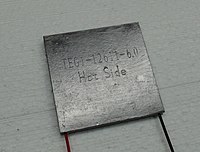
Photo from wikipedia
Abstract Within Fusion for Energy (F4E) activities underway, a new permeation facility “THERMO-PERM” has been developed at CIEMAT in order to obtain relevant data on the thermo-diffusion (also known as… Click to show full abstract
Abstract Within Fusion for Energy (F4E) activities underway, a new permeation facility “THERMO-PERM” has been developed at CIEMAT in order to obtain relevant data on the thermo-diffusion (also known as Soret or thermo-transport effect) of hydrogen isotopes in structural materials for fusion energy devices. This system allows one to differentiate and characterize gas concentration driven permeation, and permeation due to a thermal gradient applied across the sample. Structural materials for the Test Blanket Modules (TBM) in ITER are expected to be subjected to significant thermal gradients (∼100 °C per mm), whose impact on the tritium inventory has not been properly assessed mainly due to the lack of data available in the literature on this effect. The experimental challenges that these types of measurements imply are reflected in this paper. The important increase in the permeability of H isotopes observed in 316L stainless steel (∼150% with a 60 °C thermal gradient) encourages further research on this topic.
Journal Title: Fusion Engineering and Design
Year Published: 2017
Link to full text (if available)
Share on Social Media: Sign Up to like & get
recommendations!